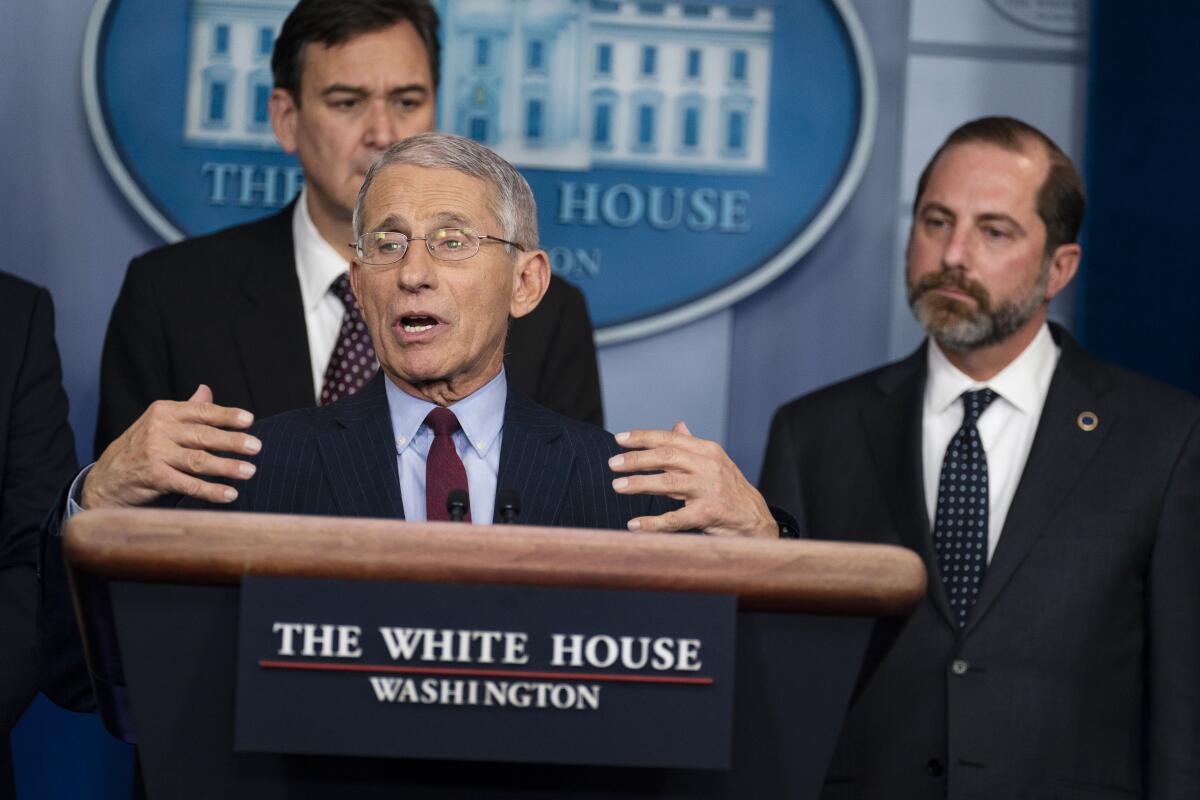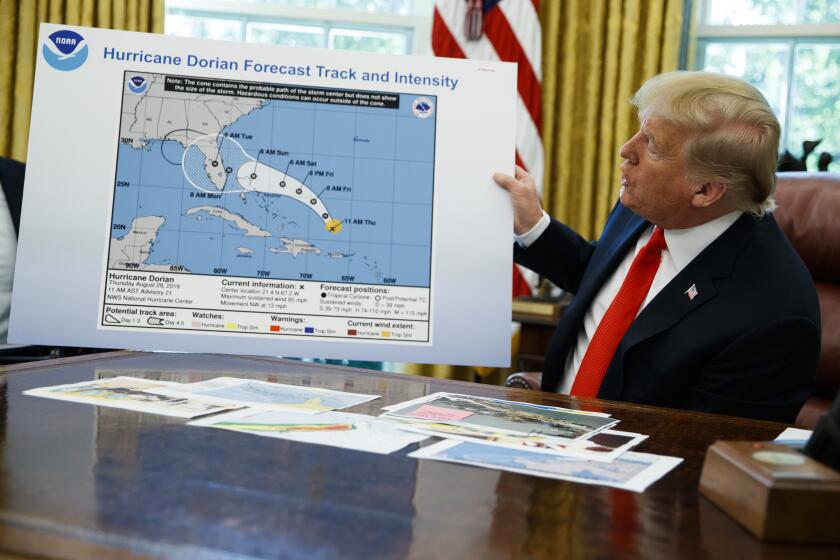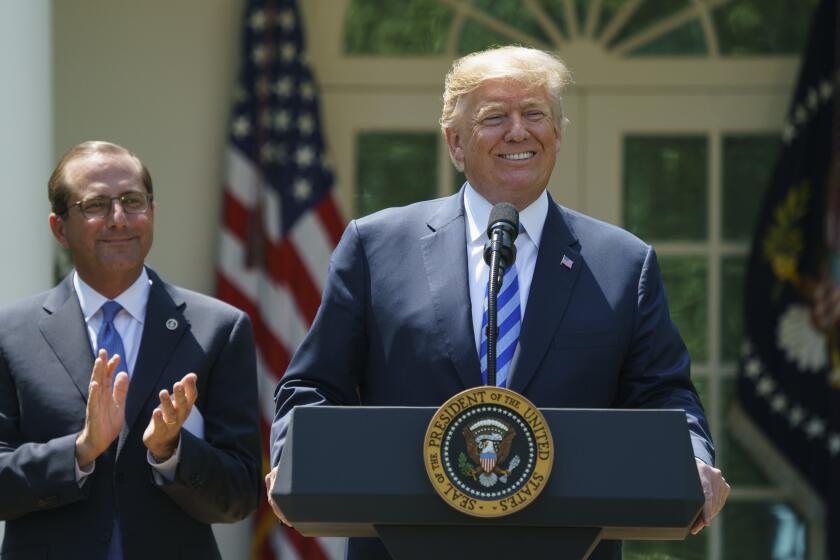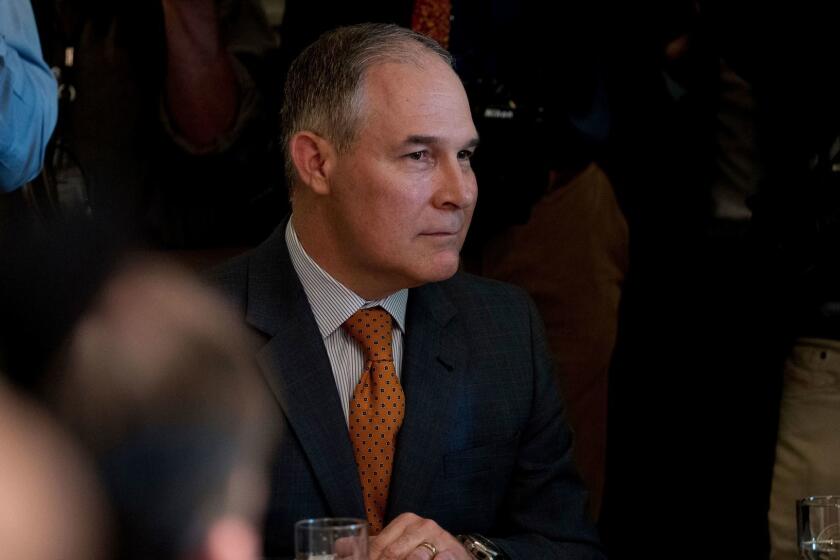Column: Coronavirus is testing the world’s faith in governments

- Share via
Viruses are known to be almost diabolically opportunistic — lethal but not too lethal, for example, to keep from killing their hosts so fast as to compromise their ability to be spread.
One might almost think that the coronavirus now making its way around the globe, known formally as COVID-19, deliberately chose its moment of outbreak to wreak maximum human disruption.
COVID-19 isn’t just testing healthcare systems, financial markets and the global supply chain — it’s also testing our faith in government.
With some 2,700 deaths among roughly 81,000 reported cases, the virus has so far wrought disorder in the global supply chain that will interfere with manufacturing worldwide and raised the prospect of lower earnings for consumer and travel and hospitality companies as vulnerable populations or those in high-risk regions are prompted to stay indoors or at home.
The panic, warranted or not, is here and it’s irreversible.
— Travel expert Patrick Smith
In China, factories in regions in and around the hard-hit Hubei province closed, though the government has encouraged many to reopen in recent weeks.
Then there’s the U.S. stock market, where the Dow Jones industrial average and the Standard & Poor’s 500 index have each shed about 7.3% of their value in the last three trading days, including Tuesday.
A few major corporations have signaled that the virus is likely to affect their earnings. Apple started the trend last week with a warning that the outbreak would prevent it from meeting its projected financial guidance for the second quarter, ending March 31. The company had projected revenue of between $63 billion and $67 billion for that period. Companies as diverse as Boston Scientific, Expedia, Carnival and General Mills followed with their own warnings.
President Trump’s trashing of NOAA’s reputation is part of his pattern of trashing scientific knowledge.
Apple pointed to both the disruption in its manufacturing, which is centered in China, and to sales of iPhones in China. Boston Scientific, which sells more than $500 million in heart devices and medical scopes in China, warned that the country’s focus on diagnosing and treating COVID-19 infections would put many other elective procedures on hold, costing as much as $40 million in revenue.
Yet the earnings impact remains mostly conjectural. The businesses most certain to face revenue declines are airlines. That industry is also the most vulnerable to business slowdowns, as pilot and airline writer Patrick Smith observed Tuesday.
“The world’s airlines are terrified, and rightly so,” Smith wrote. “Thousands of flights have been canceled, airplanes have been parked, bookings have crashed. ... If containment efforts are successful and the contagion rate slows ... air travel will be back to normal within a matter of weeks. If they’re not, it’s going to be catastrophic, especially for those airlines whose networks rely heavily on international transfers.”
Smith also noted that much of the concern among travelers, customers and businesses is divorced from reality, though that doesn’t make the concern something to ignore: “The panic, warranted or not, is here and it’s irreversible.”
We’ve compiled a list of the 10 worst Trump actions on healthcare so the cumulative impact is clearer.
At this moment, so little is yet known about the course of the virus’ spread or its lethality that the doors are wide open for baseless speculation.
Whether President Trump understands the implications is hard to gauge. In a tweet Monday he seemed to be more interested in the stock market’s slide than the public health consequences of the spread of the virus. “Stock market starting to look very good to me,” he tweeted. He asserted that “the Coronavirus is very much under control in the USA.”
That was contradicted by Nancy Messonnier, director of the National Center for Immunization and Respiratory Diseases.
“Ultimately, we expect we will see coronavirus spread in this country,” she said Tuesday. “It’s not so much a question of if, but a question of when.” The prospects were for some disruption of daily life, the agency advised.
What’s clear, however, is that Trump’s policies have deprived the U.S. of some of the tools that will be needed to contain an outbreak. Trump’s “public charge” rules, which penalize immigrants who have used public services such as Medicaid, have discouraged the targeted population from seeking out public healthcare.
At a time when it’s crucial that people who have been exposed to the virus come forward for screening or treatment, driving them underground — as already has happened — could have a devastating impact on public health.
Trump’s three-year war on the government’s scientific infrastructure also looks like sheer folly, now that sound medical and healthcare judgments are desperately needed. As I reported in 2017, he has filled the Department of Health and Human Services with members of the antiscience right wing.
In 2018, as public health writer Laurie Garrett has reported, Trump fired the government’s entire pandemic response team. Last year, Trump shut down a program known as Predict, which was charged with tracking and monitoring potential pandemics originating in animals and jumping to human hosts — like COVID-19.
In his latest budget proposal, Trump has asked Congress to cut the budget for the National Institute of Allergy and Infectious Diseases more than 7%, a $430-million cut to $5.446 billion for fiscal 2021. He also proposed to slash the budget for the Centers for Disease Control and Prevention.
Congress has blocked such budget-cutting proposals from Trump in the past, and is likely to increase those agencies’ budgets again. But it’s not comforting for those agencies to face such hostility from the White House.
Few federal agencies would entirely escape the meat cleaver in President Trump’s proposed budget, but none is facing more devastating cuts than the Environmental Protection Agency.
The administration’s overall approach to public health is exemplified by its treatment of Medicaid, in which it has encouraged states to impose regulations aimed at throwing low-income residents off the program by subjecting them to complicated reporting requirements. If there are any doubts that a sensible government policy would aim to sign more people up for health coverage, not reduce the rolls, the COVID-19 crisis should dispel them.
Skepticism about government management of the crisis isn’t limited to the U.S. Most of the skepticism, in fact, is directed at China, where doubts about the reliability of government statistics have fed fears that the virus spreads faster and is more dangerous than the regime has let on. China has been blamed for downplaying the outbreak during its earlier stages, though its subsequent efforts to combat the infection through community-wide quarantines have been ruthless in their rigor, as only an autocracy can do.
It’s easy to read too much into the sketchy information available today about the virus and anticontagion tactics. That’s true of the stock market, which is so well-primed to react to events with potential economic impacts that it typically overreacts. An apparent stabilizing trend in the market early Tuesday fell apart after officials of the Centers for Disease Control and Prevention issued an advisory that the virus was likely to spread further within the U.S. as infected persons communicated it to others on the ground.
The Dow Jones average closed down 879.44 points, or 3.15% on the day.
Yet a pullback of stock prices was inevitable, too. The stock market has been on a nearly unbroken tear to the upside for just over a year. The last “correction,” defined as a drop of 10%, occurred from December 2018 to January 2019. Bull runs like those eventually need to blow off steam; often all that’s needed is a trigger, and the coronavirus may have been it.
Panic and fear over this disease outbreak aren’t going to be washed away quickly, even if a vaccine is soon developed or the virus runs its course. Reluctance to travel will persist, and officials may well continue canceling big public events — as Italian authorities cut short the annual Venice Carnival and tightened restrictions on Milan’s fashion week in recent days.
Businesses will have to learn that as their supply chains become more attenuated and reach into parts of the country where they have little control over events, they’ll have to develop Plans B, C and D to cope with the unexpected. The public may learn the dangers of placing people in charge of government who don’t project skill at what they’re doing or a commitment to the task at hand.
COVID-19 may teach us that although we can muddle through good times without sound planning and competent leadership, in bad times nothing is more important.
More to Read
Inside the business of entertainment
The Wide Shot brings you news, analysis and insights on everything from streaming wars to production — and what it all means for the future.
You may occasionally receive promotional content from the Los Angeles Times.














